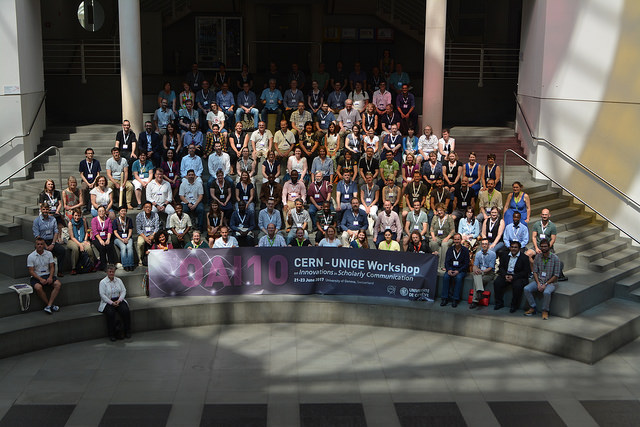
image courtesy of Elena Giglia (https://www.flickr.com/photos/eg65/35327695980/in/album-72157682640272443/)
The CERN – UNIGE Workshop on Innovations in Scholarly Communication took place at the University of Geneva in June 21st-23rd 2017. Two and a half days of speakers and workshops left us with lots to think about. The emphasis of the conference is innovations in scholarly communication and attracts attendees from across Europe and further afield.
There were seven main sessions;
- Opening keynote by Jean-Claude Burgelman
- Technical session
- Copyright and Licensing session
- OA transformation session
- OA outside session
- Social media session
- Future of repositories session
For me, one of the of most insightful sessions was the OA outside session, the experiences of the three speakers with open access really brings home what open access is all about and why it is so important beyond complying with funder’s policies and the next REF exercise. First up ElHassan ElSabry, a PhD candidate, talked about Who needs access to research? an overview of available evidence describing how there is more discussion about OA than actual studies on the benefits of OA. Next up, Dr. Nilam Ashra-McGrat from COMDIS reminding us how privileged we are in our institutions to be able to access so much research through journal subscriptions which non-governmental organization’s (NGO’s) have little or no access to. Her presentation ‘Is open access helping or hindering the international development agenda? Reflections from a consortium of developing country NGOs’ highlighted how many barriers there are to research, even so called ‘free’ research which requires users to register to access it. Finally, on a more positive note Alasdair Rae’s presentation ‘How open access opens doors – reflections on my recent ‘Megaregions of the United States’ paper’ came from a researcher’s perspective and he talked the benefits of open science and how open access opens door, he then talked us through one of his most recent OA papers which was only made possible through the benefits of open science.
Slides, recordings and links from all the presentations can be found online here.
